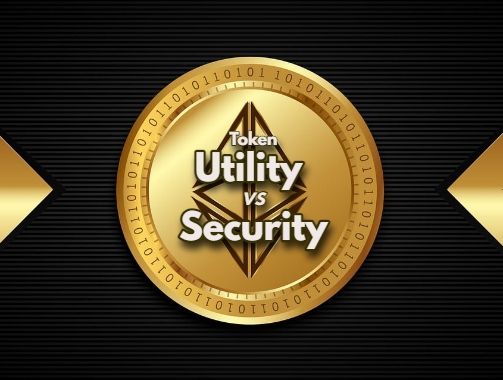Utility and security token, what’s the difference? Here are the definitions and characteristics of each of these tokens, as well as some concrete examples.
Utility and security token, but do you know what makes them different? It’s not always easy, especially as the stakes are so high, and being labelled a utility token has far-reaching consequences, as we’ll see below.
Utility and security token – definition:
The differences between a crypto token qualified as a utility and a token considered a security (financial security) are essential, as they determine the token’s regulatory status as well as the ensuing legal implications. Here are some key points of distinction:
Nature of investment:
Utility token: A utility token is designed to provide access to a specific product or service in a particular blockchain ecosystem or network. Holders of these tokens can use them to obtain goods or services, but they generally have no associated property rights or dividends.
Security token: A security token typically represents a stake in a company, project or asset and confers rights similar to those of traditional shares, such as voting rights, dividend rights, or rights to profits in the event of liquidation.
Regulation:
Utility token: Utility tokens are often considered outside the securities regulatory framework in many jurisdictions, as they are not intended to represent a speculative investment. However, regulations may vary from country to country, and it is essential to consult the relevant authorities for specific advice.
Security token: Security tokens are generally subject to strict securities regulations in many jurisdictions. This may include requirements such as registration with regulatory authorities, financial disclosure, and compliance with securities trading rules.
Risks and returns associated with utility tokens:
The risks and returns associated with utility tokens are distinct from those associated with security tokens or traditional investments. Here are some of the main risks and returns to consider when investing in utility tokens:
- Technology risks: utility tokens are often associated with technology projects or blockchain protocols. There are risks associated with the underlying technology, such as bugs, security vulnerabilities or scaling issues, which could compromise the functionality or security of the tokens.
- Market risks: As with any investment, utility token prices may be subject to market volatility. Fluctuations in demand, supply and market perception of a project or technology can lead to significant price variations.
- Regulatory risks: Although utility tokens are often designed to avoid regulation as securities, there is always a risk that regulators will change their interpretation or adopt new regulations that could affect the legality or use of tokens.
- Liquidity risks: Some utility tokens may have limited liquidity on exchange markets, making it difficult to buy or sell them in large quantities without significantly affecting their price.
Potential returns on utility tokens:
Access to services or products: Utility tokens are often used to access services or products within a blockchain ecosystem. By investing in these tokens, holders can benefit from using the services or products offered.
Ecosystem growth: If the project or ecosystem associated with the utility token experiences significant growth, the value and usefulness of the tokens may also increase. Holders can therefore benefit from the long-term growth of the ecosystem.
Increased adoption: If adoption of the project or technology supported by the utility tokens increases, this can lead to an increase in demand and, potentially, an increase in the value of the tokens.
It is important to note that utility tokens do not guarantee financial returns and are generally considered high-risk investments due to their speculative nature and the volatility of crypto markets. Potential investors should therefore carry out due diligence and understand the risks before investing in utility tokens.
Risks and returns associated with security tokens:
The risks and returns associated with security tokens differ from those of utility tokens and traditional investments. Here are some of the key considerations:
- Regulatory Risks: Security tokens are often subject to securities regulations, which can vary significantly between jurisdictions. Compliance with these regulations can be complex and costly, and changes in regulatory requirements could affect the legality or trading of security tokens.
- Market Risks: Like any investment asset, security tokens are subject to market risks such as price volatility, liquidity fluctuations, and changes in investor sentiment. Market conditions, economic factors, and industry trends can all impact the value of security tokens.
- Liquidity Risks: Security tokens may have limited liquidity, particularly if they are not listed on major exchanges. This can make it challenging to buy or sell tokens at fair market prices, especially during times of market stress or low trading volumes.
- Counterparty Risks: Investments in security tokens may expose investors to counterparty risks, such as the risk of default by the issuer or custodian of the tokens. Due diligence is necessary to assess the credibility and reliability of the parties involved in token issuance and custody.
- Legal Risks: Legal disputes, regulatory enforcement actions, or contractual disagreements related to security tokens could lead to financial losses or legal liabilities for investors. Legal due diligence is essential to identify and mitigate potential legal risks associated with security token investments.
Returns potential of security tokens:
- Income Generation: Security tokens representing ownership in income-generating assets, such as real estate properties or revenue-sharing agreements, can provide investors with regular income streams in the form of dividends or interest payments.
- Capital Appreciation: Security tokens may appreciate in value over time if the underlying assets or projects they represent increase in worth. Investors can profit from capital gains by selling their security tokens at a higher price than their initial investment.
- Fractional Ownership: Security tokens can facilitate fractional ownership of high-value assets, allowing investors to access investment opportunities that may have been previously inaccessible or cost-prohibitive. This diversification potential can contribute to overall portfolio growth and risk management.
- Global Accessibility: Security tokens issued on blockchain networks enable borderless trading and investment, providing investors with access to a broader range of investment opportunities and markets. This increased accessibility can enhance portfolio diversification and potential returns.
- Efficiency and Transparency: Blockchain-based security tokens offer enhanced efficiency, transparency, and automation in investment processes, such as issuance, trading, and settlement. These features can reduce operational costs, improve market liquidity, and enhance investor trust and confidence.
In summary, while security tokens offer potential benefits such as income generation, capital appreciation, and global accessibility, they also entail risks including regulatory, market, liquidity, counterparty, and legal risks. Investors should conduct thorough due diligence and seek professional advice before investing in security tokens to assess and manage these risks effectively.
Conclusion:
The main difference between a crypto token qualified as a utility and a security token lies in their nature and regulatory status. Utility tokens are primarily designed to provide utility within a blockchain ecosystem, while security tokens generally represent a form of investment in an asset or business and are subject to stricter regulation as securities.


Un commentaire sur « Utility and security token, what’s the difference? »
Les commentaires sont fermés.